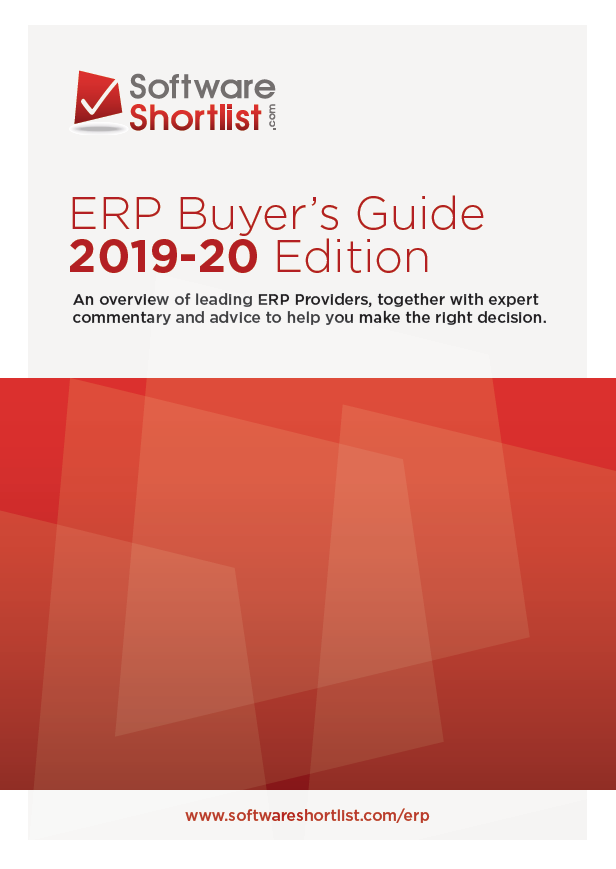Manufacturing ERP: Past, Present & Future
> Past: The origins of ERP
Enterprise Resource Planning (ERP) as we know it today has it origins in the middle of the 20th century. It started with big manufacturing companies using automated batch processes for purposes as material requirements planning, inventory control and production planning. But for small companies the use of large computer systems like this was often too costly to be practical so they had to manage their processes in other less-integrated ways.
> Present: Realizing the benefits of ERP
Today, ERP has come into reach of every company, regardless of size. Modern ERP systems are much more powerful than their predecessors, taking advantage of modern processes, cloud computing and other technologies. With interconnected ERP modules, relevant information can be made available immediately for everyone in the company who needs it – accessible via workstations, PCs or handheld devices; printed out if necessary; and/or fed directly into dedicated production-control computers. The interconnection of processes by ERP eliminates the need for in-between documents and the handling of them. Manufacturing ERP systems can therefore yield significant benefits by improving productivity, reducing costs and making a smooth and reliable operation possible.
> Future: Beyond the organization’s boundaries
The trend is towards more complete integration of a company’s ERP system with those of their key suppliers and major customers, potentially creating an ERP environment exceeding the borders of any single organisation. There are challenges to achieving this, but there are substantial benefits on offer by enhancing overall efficiency and cooperation between partners.
Exploring a Typical Manufacturing ERP System
Let’s illustrate the benefits of ERP systems by exploring a typical manufacturing company that produces products on sales orders, and stepping through the process from sales order to delivery, invoicing and general ledger.
> Sales order module
A manufacturer’s ERP system will certainly have a sales order module. Sales orders are entered and the system will look in the inventory records to see whether the ordered items are in stock or whether the items have to be produced.
> Production Control, Inventory Control & Purchase Orders
When the order is confirmed, reservations in the inventory are made. In the case where the ordered items are yet to be produced, production orders are then automatically generated. When one or more components for the end product are not in stock, purchase orders are produced. The system also looks for stock items that have crossed the minimum stock level and produces purchase orders when necessary. The suppliers should confirm purchase orders, especially where terms as price and delivery date are concerned. These purchase order confirmations are entered in the system.
The inventory control manager is informed when to expect delivery of purchase orders. When the goods arrive, the inventory manager checks quantity and quality and records these findings. Purchase invoices do not have to be sent to various departments for checking because the purchase and reception of goods are already validated.
> Accounts Payable, Accounts Receivable & General Ledger
Validated purchase invoices are automatically transferred to the Accounts Payable module and appropriate journal entries are automatically made into the General Ledger module. Every stage in the production process can be controlled by the system. At each of these stages journal entries can be generated. When the order is completely processed, the sales department can produce an invoice. The sales invoice is automatically transferred to the Accounts Receivable module and entailing journal entries are fed into the General Ledger.
Benefits of ERP for Manufacturers
As shown in the example above, the benefits of effective use of ERP in a manufacturing environment are compelling. These benefits include:
1. Improved productivity
Information about a sales-order is entered only once. Relevant information about the customer is already available, such as previous offers related to this order, discount rates, payment conditions, shipping method and the like.
Production-orders are generated on the basis of validated sales-orders, since the relevant information can be readily accessed; the occurrence of errors is greatly reduced. Whenever human action is needed, it can be requested by the system and the relevant information is immediately available. This enables an efficient workflow and reduces the need for printed documents and their manual handling.
2. Cost reduction
ERP means less office work and thus lower costs. ERP makes a closer cooperation with suppliers possible which enables the realisation of a just-in-time delivery policy; this reduces the costs of stock keeping and releases capital otherwise invested in inventory.
ERP with its ‘innate’ intelligence supports a more efficient production planning leading to lower production costs.
3. Smoother operation and improved reliability
An ERP system, when competently operated will improve the performance of the company. It will enable the company to adhere strictly to agreements with customers and deliver a constant quality of products. The rise in the company’s reputation is hard to translate in money value but all the same it is a considerable benefit of ERP.



